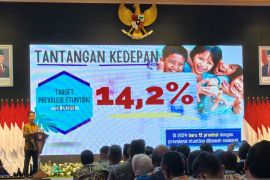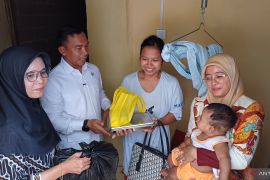"Based on the family information system, out of 42 million fertile couples, 8.6 million families are at risk of stunting, including 1.4 million families in the decile 1-categorized group. (Handling) this is a priority," Population and Family Development Minister Wihaji stated during a working meeting with Commission IX of the Indonesian House of Representatives in Jakarta on Tuesday.
Wihaji, concurrently head of the National Population and Family Planning Agency (BKKBN), emphasized the importance of involving religious, traditional, and community leaders in the efforts to reduce stunting rates.
"We will handle nutrition, access to clean water, and education on prevention and treatment. Sometimes, people are more influenced by religious and traditional leaders regarding stunting prevention behavior," he noted.
In addition to nutrition, he stated that access to proper toilets and habitable housing is also crucial in the efforts to reduce stunting rates.
Related news: West Java lauded for scholarship for families backing family planning
He explained that of the 8.6 million families at risk of stunting, 3.7 million families lack proper toilets, 1.9 million families lack access to safe drinking water, and 4.3 million fertile couples face four types of high-risk pregnancies and also do not use modern contraception.
The four types of high-risk pregnancies include pregnancies at a very young age (under 20), pregnancies at an older age (over 35), pregnancy intervals of less than two years, and having more than four pregnancies.
On the same occasion, Health Minister Budi Gunadi Sadikin encouraged the National Nutrition Agency (BGN) to help reduce the prevalence of stunting by providing additional food and nutrition to pregnant women.
He stated that two key interventions to reduce stunting include providing iron tablets for pregnant women and additional nutrition for pregnant women with chronic energy deficiency.
Of the 65 percent target for pregnant women to consume iron tablets, only 15.5 percent has been achieved, while additional nutrition for pregnant women with chronic energy deficiency has only reached 40.7 percent of the 84 percent target.
Related news: Strong families key to Indonesia's global competitiveness: BKKBN
Translator: Martha Herlinawati Simanjuntak
Editor: Rahmad Nasution
Copyright © ANTARA 2025












